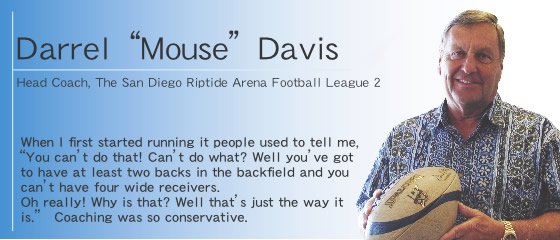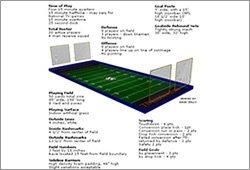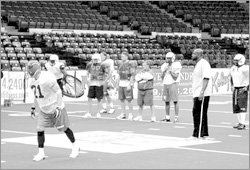YuYu interview Darrel “Mouse” Davis
 |
| —— I understand that you are one of the “fathers” of this Arena Football League. How did that come about? Well there was a guy by the name of Jim Foster, and Jim had invented the game. He was sitting in an arena and had the thought to play football indoors. So he held a practice game and later showed me some of the tapes. Initially I thought it was really boring, so when I became Director of Football Operations I looked at how we could spice things up. Then we sat down and worked out the rules and basically what every team is running now. The first thing we did was to open up the offense and make it closer to what we were already running. We asked ourselves, What do fans like? Touchdowns of course! so we're going to have a lot of touchdowns lots of scoring and some limits on the defense. But make no mistake, it's still football and so it's got to be physical and people are still getting knocked around. The only difference is that all this is going to be happening RIGHT IN FRONT OF PEOPLE! In Arena Football fans are so much closer to the action and so players are getting knocked around and into the stands fans just love it. Those are the things fans enjoy, so we oriented the rules towards that end. The challenge was to see if we could do all that in a small little area and I think we've done a darn good job. When Jim brought it to me we (my staff and I) already had a reputation as being exciting offensively, so we tried to bring that to the league. One idea we kicked around was to have 8 offensive players and 7 defensive players, but when I suggested that to him he replied, That would be un-American.(laughing) —— Coach you’re 71 now, how long have you been doing this for now? Well, if I had been coaching straight through, every year, this would be about my 50th year, but itユs not quite so because I've had a couple of respites in between. I was in the service for a couple years and out of coaching for a few more. All told, from high school to college and the professional level, I've been at it over 40 some years. —— So you like it then? (laughing) Well, for me football has been my joy and my career. What coaching does is it keeps you young, cuz your always working with young people that are passionate about what they do. So they'll bust their ass to do what you want them to do. In life a lot of situations are based on what can I get from you, not what can I really do today or what can we do together. So from that standpoint it's always fun. Fun in football though is always correlated with winning, cuz you've got to win. If you don't win, it's still okay, but it sure is more fun when you're winning. When you're losing you have to spend more time justifying why you lost, rather than concentrating on the things you need to. Hands down, winning is more fun than losing. —— I can tell you love what you’re doing, how did you decide you wanted to be a coach? Well as a young kid, an eighth-grader, that's when I determined that I wanted to be a coach. I loved playing and I was a pretty good athlete too well, that might be overstating it a little. I was okay I could play football, basketball, baseball, track. I could do all those things, but I had also figured out that I was not going to be big enough to be a pro-athlete, because I was smaller (5'6') than just about everyone else. —— So when most kids are thinking about being coached, you’re thinking, “I should be a coach.” Yep. Even when I was a quarterback in high school, I was already reading football books and things. One time I made up a play in the huddle, obviously it wasn't going to be any good since we never practiced it or anything, but I had read about this thing called a "screen-play". So I told the guys what to do and it was just plain awful. After we left the field I remember the coach asking me, What was that play? So thinking quickly I told him it was one of his. —— I’ve got to ask you, what’s the story behind your nickname “Mouse”?  Well it's not very exciting but I'll tell you anyway! (laughing) the truth is that when I was freshman in high school and I was playing varsity baseball, even though I'm a lot smaller than most of the guys because I 'd been playing since I could walk. So anyway, I'm a lot smaller and my dad used to call me bore mouse around the house whatever the hell that is because I had small hands. So one day I was playing second base and my brother was catching and he throws me the ball down to second base and I dropped it. So he yells over Nice hands Mouse! and that was it! From that point on all my teammates called me Mouse and within two years even the teachers were calling me Mouse. Later when I went to college people kept it going. So when I went into the service I thought I was finally going to leave that all behind I'm going to lose that nickname. My older brother did it, so I thought it might work for me too. Turns out that when military training I looked around and saw all these guys that I 'd just been playing against in college. Hell, I knew right then I was "Mouse" alreadyand it's been with me ever since. Well it's not very exciting but I'll tell you anyway! (laughing) the truth is that when I was freshman in high school and I was playing varsity baseball, even though I'm a lot smaller than most of the guys because I 'd been playing since I could walk. So anyway, I'm a lot smaller and my dad used to call me bore mouse around the house whatever the hell that is because I had small hands. So one day I was playing second base and my brother was catching and he throws me the ball down to second base and I dropped it. So he yells over Nice hands Mouse! and that was it! From that point on all my teammates called me Mouse and within two years even the teachers were calling me Mouse. Later when I went to college people kept it going. So when I went into the service I thought I was finally going to leave that all behind I'm going to lose that nickname. My older brother did it, so I thought it might work for me too. Turns out that when military training I looked around and saw all these guys that I 'd just been playing against in college. Hell, I knew right then I was "Mouse" alreadyand it's been with me ever since.It hasn't all been bad though it's been kind of fun sometimes. In fact, at Portland State we were the Vikings, but our unofficial mascot was a mouse. Our quarterback was Neil Lomax, who broke a ton of NCAA records, and his brother wore the mouse outfit. Everywhere I went people have picked up on it. In Houston, with the USFL Gamblers we had a great receiving core and they were known as the Mouseketeersモ, and jeez they could fly. Every chance they had all the guys would be wearing their mouse-ears. Seems at one time or another, cheerleaders, players, mascots everyoneユs been in on it! I figure it's only a matter of time before something like that happens here. 
Riptide Cheerleaders strike a pose on media night
Well the game and the weather! We've got a great group here with a chance to build something fun and successful. Coming to San Diego, I thought I'd be playing some golf here, but in coaching one thing leads to another and you end up getting more involved than you anticipated. When I do something I like to do it well, so I can't help but put more into it... It takes a little extra to get results sometimes, especially when you want to build something special. I've had some opportunities to go back to the NFL, but at this stage of my life I wasn't looking for a 20-hour a day job. It's a very consuming profession and the demands at that level are very high. San Diego is a great place and I think this team and organization have a lot of potential. Being here I get the best of both worlds, I get to stay involved with a game that I love without giving away my entire life. Of course what I'd like to do is to get them winning. You always want to win in the game of football. We've had some problems, but I'm hoping to get them going. That and I sure wish I could find more time for the golf course! —— You’ve coached at every level and every league I can think of, what’s that been like? I have been a few places. I've been just about everywhere from high school, college, the pros, Canada, NFL, USFL, WFL. You name a league and I've coached in it. I can't hardly keep a job! (laughing) It's been a great thing were I've been able to see a lot of the world through coaching, not just the US, but Canada and Europe too. —— How does the Arena Football League stack up compared to some of the other leagues?  Well there are some obvious differences; the Arena for one, so the field is smaller, the number of players on each side in arena ball it's an eight-on-eight game, and then the kicking game uses the nets to keep the ball in play. But it's still football and it looks and feels like football. We play 16 games like the NFL, right here at the Sports Arena, but because of the rules we're a bit more exciting to watch offensively, because of the scoring. Arena Football is more of a game of one-on-one skills than a scheme game like the NFL or college ball. Here receivers and big guys are even more critical to our game. Also because teams only carry 20 players in the AFL2, players have to play both sides of the ball. In the NFL guys have highly specialized, specific skills and in Arena League they have to be better all around, because they have to learn twice as many skills. Way back when I played college ball you had to go both ways too. So in the Arena League offensive linemen are playing defensive line--great players on one side of the ball have to learn to play on the other side. So it makes it a little tougher. But that's how most kids grew up playing. Arena Football does have 2 specialists, one of them is always your quarterback, and the other could be a center or it might be a receiver. On the defensive side, your specialist is usually a defensive back to counter the quarterback. Itユs a real chess match. Usually when you get a real good D-lineman, he can't play offensive line very well, and the good offensive linemen don't usually play defense very well. So you've got to make up your mind which way you're going to go for offense or for defense. We've always tried to set it on defense first, and then see if they can play a little offense. Sometimes you've got to roll the dice. Well there are some obvious differences; the Arena for one, so the field is smaller, the number of players on each side in arena ball it's an eight-on-eight game, and then the kicking game uses the nets to keep the ball in play. But it's still football and it looks and feels like football. We play 16 games like the NFL, right here at the Sports Arena, but because of the rules we're a bit more exciting to watch offensively, because of the scoring. Arena Football is more of a game of one-on-one skills than a scheme game like the NFL or college ball. Here receivers and big guys are even more critical to our game. Also because teams only carry 20 players in the AFL2, players have to play both sides of the ball. In the NFL guys have highly specialized, specific skills and in Arena League they have to be better all around, because they have to learn twice as many skills. Way back when I played college ball you had to go both ways too. So in the Arena League offensive linemen are playing defensive line--great players on one side of the ball have to learn to play on the other side. So it makes it a little tougher. But that's how most kids grew up playing. Arena Football does have 2 specialists, one of them is always your quarterback, and the other could be a center or it might be a receiver. On the defensive side, your specialist is usually a defensive back to counter the quarterback. Itユs a real chess match. Usually when you get a real good D-lineman, he can't play offensive line very well, and the good offensive linemen don't usually play defense very well. So you've got to make up your mind which way you're going to go for offense or for defense. We've always tried to set it on defense first, and then see if they can play a little offense. Sometimes you've got to roll the dice.—— So you’re still experimenting? Absolutely! Coaching is all about making adjustments and fine tuning. (laughing) When I was coaching in college, I looked back at some of the things I did early on and thought, How could I've been so dumb? You know what happens is that some of it's a belief in what you're doing. Like every young coach starting out really believes that they're doing everything right and then one day you look back and say, I didn't really know very much then, but we believed we did! (laughing) I was coaching the defense and now I look back at some of the things I used to do and thought "Jeez, did I put some of those guys in a bad position" and they still did pretty well! (laughing) When you believe in what you're doing, things tend to work out. 
Mouse putting the offense through its paces during practice
Well people didn't like it because it shook up the status quo the old school coaching fraternity. When I first started running it people used to tell me, You can't do that! Can't do what? Well you've got to have at least two backs in the backfield and you can't have four wide receivers. Oh really! Why is that? Well that's just the way it is. Coaching was so conservative. I can remember when Paul McGuire was at ESPN and he wanted to find out a little bit about our offense, so I'm telling him about what we were doing and he went back, he was living in Buffalo, so he told the Buffalo staff what we were doing and those guys said, That's impossible. You can't do that! and now, everyone in the NFL is running something similar! We run a modified version of it here with the Riptide. You can't stop it when it's executed properly. The knock on the run-and-shoot was that it was more of a sandlot back yard style, but the truth of it is that it requires a lot more discipline than any other offense because you have to make more decisions. It's an offense that provides the receivers and quarterbacks more options depending on what the defense gives them. You need a sharper player and what people will tell you is that players aren't smart enough to make all those decisions. I strongly disagree. They're smart enough, if you're smart enough to tell them what to do. When I took over as the Offensive Coordinator of the Detroit Lions, they weren't just last in offense they were dead last. If they had played four more games they would have still been last. It was pathetic. And so in two years we went from last to 4th in the league on offense. We came in and we ran when we should pass, and passed when everyone thought we should run. Defenses didn't know what to do! Most teams run and run and run to set up the pass, but we passed to set up our runs. It's actually more effective and we even lead the league in rushing efficiency.Not only that, but it's so much more fun and itユs more fun for the fans. So why wouldn't you use it? (05-16-2004 issue,Interviewed by Terry Nicholas) |

